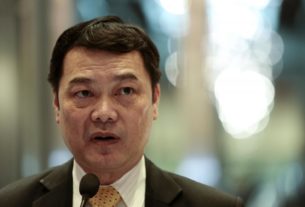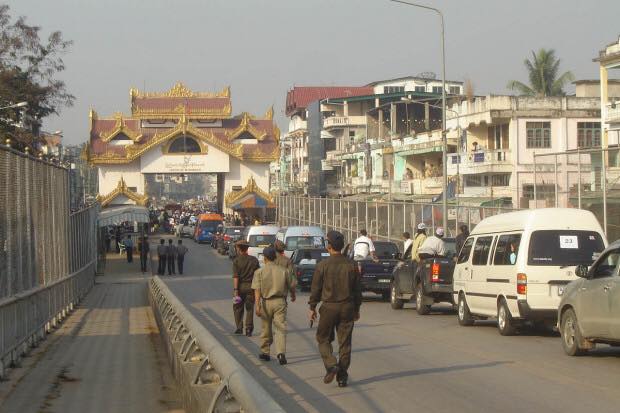The Bangkok Post has picked five key issues which are likely to have a big impact on the public this year, in politics, finance and society.
Race for Bangkok governor heats up
Work on five electric railway projects is likely to start this year after delays in the past few years due to political unrest.
Big changes to health care schemes
Court to rule on Preah Vihear dispute
Charter amendments down to wire
Race for Bangkok governor heats up
By Nattaya Chetchotiro
The Bangkok governor election next month is likely to come down to a two-horse race between the two largest parties, just as it has in the past.
So far, no independent candidate has created enough buzz to change the game.
The Democrat Party, which has won the past three gubernatorial elections, is expected to fight the Pheu Thai Party in the Feb 17 contest with everything it can muster. Bangkok is a stronghold of the Democrats.
The Democrats have nominated incumbent governor MR Sukhumbhand Paribatra as their candidate. Publicly, party executives said they picked MR Sukhumbhand over others because of his achievements as governor.
However, a party source said the executive board was aware the incumbent is a controversial candidate, as his performance as governor is likely to be criticised.
The source said the party has not been forthright in telling MR Sukhumbhand where he has come up short as governor. He has been criticised even by the party’s selection panel for failing to cooperate with the party.
Before he was selected, the party had tried to find an alternative. Internal support tipped toward Korn Chatikavanij, the deputy party leader.
But Mr Korn was slow to enter the race. He was nominated only a few days before the executive board chose its candidate.
As a result, MR Sukhumbhand beat Mr Korn to become the party’s candidate in a 9-4 vote.
Had Mr Korn decided to seek the candidacy sooner, he would have been picked by the board, the party source said.
One party executive, who declined to be named, said the party made the right decision to field MR Sukhumbhand, who has close ties with the party’s district and Bangkok councillors.
Pheu Thai appears to have decided against choosing seasoned politician Khunying Sudarat Keyurapan despite her popularity in Bangkok.
The Pheu Thai Party has instead thrown its support behind Pol Gen Pongsapat Pongcharoen, the deputy national police chief.
A party source said the plan calls for Pol Gen Pongsapat to run as an independent candidate, and Pheu Thai will rally its supporters in the capital to vote for him.
The party figures the PR-savvy police general can pull in 300,000 votes on his own.
With another 600,000 votes which the party claims it can mobilise, Pol Gen Pongsapat has a chance to become the next Bangkok governor.
Mega-transport projects get push
By Amornrat Mahitthirook
Work on five electric railway projects is likely to start this year after delays in the past few years due to political unrest.
The five planned railways have a combined distance of 66.3km. Bidding contests for some of them have been delayed since last year and other projects are expected to enter the construction stage this year.
The first one is the 26.3km-long Bang Sue-Rangsit section of the Red Line.
A bidding contest for its construction contract is expected this year.
The second project is the 11.4km Mor Chit-Saphan Mai section of the Dark Green Line.
Its environmental impact assessment has yet to be revised after a design change at the Bang Khen roundabout.
Its cost has to be reconsidered as well. Its bidding contest is expected in September this year.
Construction should start in the same month and the section will be completed in September 2017.
The third project is the 7km Saphan Mai-Khu Khot section of the Dark Green Line. Its bidding contest took place last November.
Construction will start in September this year and it will be completed in September 2017.
The fourth project is the 14km Taling Chan-Salaya section of the Red Line. Its bidding contest took place last October. Its environmental impact assessment is being reviewed.
Construction will start this April and should be completed in October 2018.
The fifth project is two other extension routes of the Red Line to connect to the Airport Rail Link that will reach Suvarnabhumi and Don Mueang airports.
One is a 7.9km extended section from Phaya Thai to Bang Sue. This section passed an environmental impact assessment. Its bidding contest took place last October and construction will begin this month. The link will be completed in December 2016.
The other section is from Phaya Thai to Don Mueang airport. Its bidding contest is expected this July. Its construction will begin in January next year and be completed in January 2019.
Bangkok has five operational electric railway lines at present, with a combined service distance of 80km. Five other electric railway projects with a combined distance of 83km are under construction.
They are the Red Line’s 15km Bang Sue-Taling Chan section, the 23km Purple Line from Bang Sue to Bang Yai that will be finished in October 2015, the Blue Line’s 27km section from Bang Sue via Tha Phra to Bang Kae that will be completed in September 2016, the Dark Green Line’s 5.3km Wong Wian Yai-Bang Wa section that will be completed this August, and the Dark Green Line’s 12.8km section from Bearing to Samut Prakan that will be finished in August 2017.
In addition, work on mega-railway developments will speed up.
The government has earmarked 176 billion baht in funds for rail investment. Bidding will start this year.
The development includes improving rail lines nationwide by widening dual tracks with a standard gauge of 1m to 1.435m.
Big changes to health care schemes
By Paritta Wangkiat
The universal coverage health care system is undergoing huge change. The government is expected to press ahead with its effort to standardise treatments under the three main state health care schemes.
However, Public Health Minister Pradit Sintawanarong has insisted the three schemes – the Civil Servant’s Welfare Fund (CSWF) for civil servants and their family members, the Social Security Fund (SSF) for employees in the private sector, and the Universal Healthcare Scheme for people who are not entitled to the CSWF and the SSF – will not be combined in one.
The National Health Security Office secretary-general Winai Sawasdivorn said the key to the overall success of the changes is to establish a central system to control the operation of the schemes.
The operator of each scheme will still be allowed to run its health programme separately, even as it is regulated under a central system.
Dr Winai said the minister wants to set up a clearing house for patient claims and a national information centre, possibly this year.
The clearing house will monitor public medical expenses and disburse payments.
The national information centre will share patient records and enable patients to receive continuous treatment even if they are transferred from one scheme to another.
Dr Winai said clinical practice guidelines and medical protocols will be used as guidelines for operators in each scheme.
They will ensure treatment is standardised among patients across the schemes.
“This policy will lead to a revolution in the health care system,” Health Insurance System Research Office director Samrit Srithamrongsawat said.
“Every patient will receive drugs and treatment according to their symptoms, not according to different rules or privileges under each scheme.” Potential savings to the government could reach 70 billion baht a year.
Court to rule on Preah Vihear dispute
By Thanida Tansubhapol
The International Court of Justice (ICJ) is expected to give a ruling clarifying its 1962 verdict over the ownership of the Preah Vihear temple and surrounding areas later this year.
Cambodia submitted a request to the ICJ two years ago seeking clarification of its verdict which awarded to Cambodia ownership of the temple.
The ruling did not specify which country has the rights to the land around the temple.
Thailand and Cambodia last year sent written observations to defend their positions to the court.
The ICJ has invited Thailand and Cambodia to join an oral hearing on April 15-19 before its verdict is handed down six months later, probably in October.
Thai ambassador to the Hague Virachai Plasai leads Thailand’s team which also comprises three foreign lawyers.
The government argues the court has no authority to decide on the border problem as the issue should be settled by the two countries.
However, the source said Thailand is ready to accept the court’s decision however it turns out.
“The two countries are still neighbours regardless of the result,” he said.
The Foreign Ministry is preparing to produce a documentary about the temple, and will step up a campaign to educate the public about the ramifications of the decision.
Mr Surapong said the ministry will also work with the Interior Ministry to ensure the public is properly informed about the case.
“What frightens us is that some groups will manipulate people to do bad things if they don’t like the verdict,” he said.
“This will be a huge problem because the ICJ verdict must be respected.”
Charter amendments down to wire
By Nattaya Chetchotiros
The government’s plans to amend the charter are a potential minefield which it will have to navigate carefully in the months ahead.
The pursuit of a constitution rewrite has been plagued with obstacles from the outset.
The government envisioned a charter change via a drafting assembly but the plan has reached an impasse with the bill setting up the assembly stuck in its third and final reading stage in parliament.
The government put a hold on the bill after the Constitution Court ruled a referendum should be conducted prior to any charter change.
The referendum is likely to cost taxpayers up to 2.4 billion baht, with the prospects of success for the government remote, according to critics.
Deputy Prime Minister Chalerm Yubamrung says the support of at least half of all eligible voters, or 24 million people, is needed for the referendum to be valid, which is too big a challenge.
Chaturon Chaisaeng, former acting leader of the now-disbanded Thai Rak Thai Party, says the referendum will lead to a political dead-end.
He said the Referendum Act under which the poll will be held sets too high a threshhold for approval.
Both Mr Chalerm and Chatuporn Prompan, the red-shirt co-leader, are worried Pheu Thai is asking for trouble trying to hold the referendum, which could also encourage social divisions.
Opponents would come out in force to resist charter change and Pheu Thai might find itself having to defend the changes in the Constitution Court, if opponents decide to mount a legal challenge.
Former premier Thaksin Shinawatra, however, is adamant the referendum must be held.
Prime Minister Yingluck Shinawatra has admitted she decided to back the referendum idea after consulting her brother, Thaksin.
But less than a month after floating the referendum issue, the government has begun to realise the path is littered with many political and social obstacles.
Apparently aware of the potential danger the referendum entails, the premier has said that if the referendum does not work out, the government will come back and rewrite the charter section by section rather than attempting to rewrite the charter in its entirety.
Varathep Rattanakorn, secretary of the panel studying the amendments, said the referendum will proceed within a 120-day timeframe.
The problems which the government is encountering look certain to delay the May deadline which the ruling party has proposed for wrapping up the referendum.
Source: http://www.bangkokpost.com/news/local/328931/issues-to-watch-in-2013


